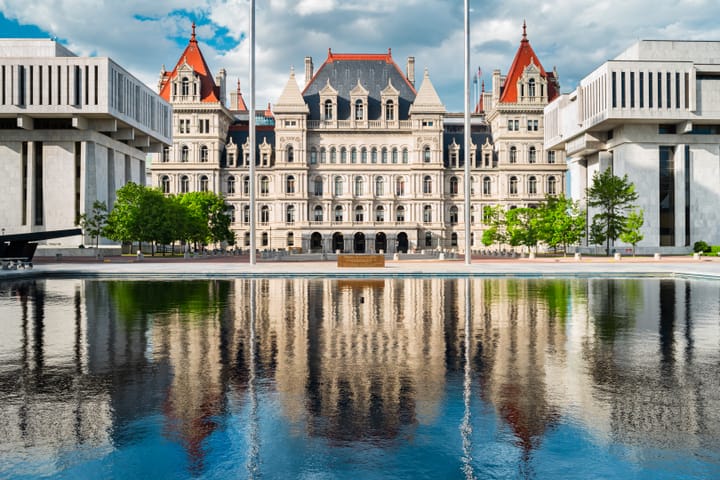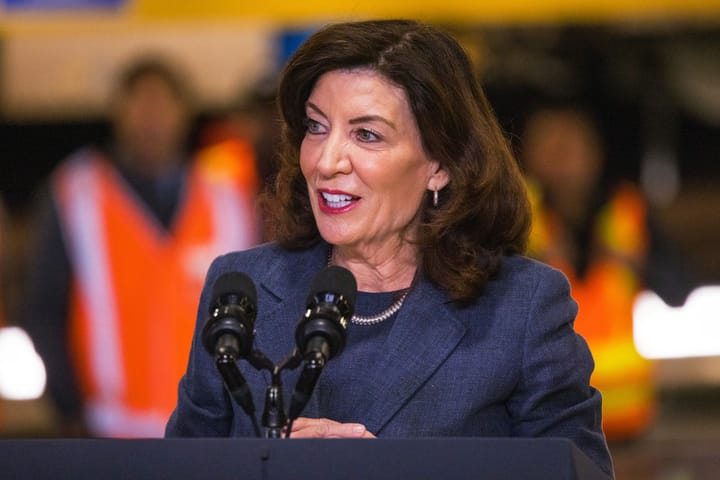Campaigns for state offices in New York have long relied on wealthy donors and special interests for their funding, but more will soon be powered by small-dollar donations from everyday New Yorkers.
In the New York State budget they passed this week, lawmakers included $39.5 million in funding for the state’s new public campaign financing program. The Brennan Center for Justice and other campaign finance reform advocates applauded the funding’s approval.
The program, which will be in effect starting in the 2024 elections, will offer candidates public matching funds for small contributions they raise, amplifying small-dollar donations of up to $250. Candidates for statewide office who choose to participate in the program would be eligible for public matching funds of $1,500 for a $250 contribution, while candidates for state legislative office would be eligible for a public match of up to $2,300 for a $250 contribution.
The funding for the program made it through the wringer of the state budget process for 2024 after rumblings in Albany earlier this year that lawmakers might find an excuse to delay the program. A new bipartisan state agency, the Public Campaign Finance Board (PCFB), had already started up to administer the program for state legislative candidates in the 2024 election and statewide candidates in 2026, but as of this week was awaiting word of its funding level.
In March’s budget negotiations, both chambers of the legislature agreed to meet the governor’s proposed funding level for the public campaign financing program at the figure of $39.5 million. After weeks-long closed-door negotiations over the $229 billion New York budget, that amount was included in the plan that was approved this week. It is composed of $25 million for matching funds and $14.5 million for program administration, meeting part of the PCFB’s request, according to budget analysts at the nonprofit Reinvent Albany.
Joanna Zdanys, senior counsel in the Elections and Government Program at the Brennan Center for Justice at NYU Law, said in a statement, “New Yorkers overwhelmingly support small donor public financing. The program will weaken megadonors’ grip on Albany. It will make it easier for candidates to run constituent-powered campaigns. And it will make elected officials more responsive to the communities they serve, an important step forward following a budget process that left many New York voters feeling unheard.”
The coalition Fair Elections for New York, which had rallied for the small-donor match at the State Capitol and last month launched a call-in campaign urging lawmakers to follow through on funding the matching program, similarly applauded the budget appropriation.
“New York’s small donor matching program—which is now funded and ready for the 2024 election—is a key model for states and municipalities across the country,” said Karen Wharton, Democracy Coalition Coordinator for coalition member Citizen Action for New York. “It gives more power to everyday people, rather than special interests and megadonors, and is broadly popular with voters. It can be transformative for our national democracy.”
For decades, New York elections were a playground for large donors to funnel money to candidates through the “LLC loophole,” which allowed pass-through companies to be treated as individuals and package multiple large donations—for example, up to $65,100 to statewide candidates. From 2016-2019, according to an analysis by the Campaign Finance Institute, only 9% of candidates’ funds in gubernatorial and legislative elections came from individuals giving $250 or less. The loophole was finally closed by legislation signed into law by former Gov. Andrew Cuomo, after exploiting it to raise millions from state business interests, in January 2019.
Last cycle, Democratic Gov. Kathy Hochul’s campaign hauled in more than $2.5 million from 51 billionaires and their families, the nonprofit Public Accountability Initiative found. Hochul raised a record-shattering $60 million in her bid for a full term as governor. A campaign finance disclosure in 2022 showed that less than one percent of Hochul’s donations had come in donations of $250 or less, with donations rushing in from wealthy real estate industry groups as the governor considered a major Penn Station redevelopment plan and other issues.
Hopefuls for elected office in New York told Sludge that they eagerly awaited the launch of the state public campaign financing option after the 2022 cycle, which would enable them to fund their campaigns by amplifying grassroots donations from the communities they were running to represent.
The voluntary matching system, passed into law in April 2020, builds on the model of a widely-used program that has been run for decades in New York City. In New York City’s experience, the matching program’s impacts include incentivizing small donors: more than 92% of individual contributions to all participating candidates in the last election cycle were in the amount of $250 or less, according to data from the city’s campaign finance body, helping grassroots candidates run for office without already having a rolodex of wealthy donors.
In New York’s program, donations of $5-$250 to qualifying and participating statewide candidates—governor, lieutenant governor, attorney general, and comptroller—will be matched at a 6-to-1 ratio, with candidates being able to claim up to $3.5 million for each race. Participating candidates are free to raise and spend private contributions outside of the matching program, subject to campaign finance limits.
Donations of $5-$250 to legislative candidates—for state Senate and Assembly—from individuals in the district will be matched at an innovative ratio: 12-to-1 for the first $50, 9-to-1 for the next $100, and 8-to-1 for the next $100. For example, for a participating New York Senate candidate, a $100 contribution from a district resident would be eligible to receive $1,050 in public matching funds, for a total of $1,150 raised.
In order to participate, candidates must first qualify by reaching a threshold of small donations raised, and must submit to regular disclosure reports and funding audits, with program data posted transparently online. Candidates must also commit to taking part in public debates and limit personal spending on their bid, among other requirements.
Earlier this year, an analysis by the Brennan Center and the nonpartisan OpenSecrets found that New York’s innovative matching formula could transform campaigns’ funding sources. In statewide races, the share given by New York residents in donations of $250 and under could leap from 6% to 41% of all campaign funds under the match, according to the groups’ modeling. In New York legislative elections, the amount contributed by small donors could shoot up from 11% to as much as 67% of all donations—an increase entirely from residents of a Senate or Assembly district, reflecting 2022 state campaign finance data. In parallel with the small-donor match, the state law taking effect this cycle also significantly reduces campaign contribution limits that had been the highest in the nation.
Public campaign financing programs in New York City and San Francisco have been strengthened by voters in recent years, with voters’ participation in a “democracy voucher” program rising in Seattle, and Oakland voters recently adopting a voucher program in their city.
Photo by New York Communities for Change, a Fair Elections NY coalition member, on Twitter.



